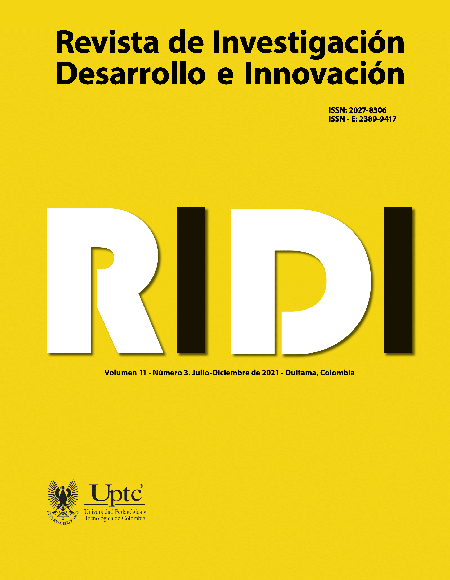Analysis of patents related to microencapsulation with yam (Dioscorea Rotundata) coatings by spray drying

Abstract
The objective of the work was to carry out an analysis of the patents granted and related to the process of microencapsulation of physiologically active compounds, with starchy coatings of yam (Dioscorea rotundata), by spray drying. Methodologically, a systematic process based on three stages was carried out, related to: the planning of search activities, execution and analysis of the results obtained, which led to the review of a total of 194 international patents. The result of the patent analysis allows establishing that the inventions granted related to spray drying technology were relatively low and were not directly related to the use of yams, for the development of microencapsulated products with physiologically active properties. This scenario represents multiple possibilities for the development of inventions, which involve the generation of new products with nutraceutical and pharmaceutical properties. Spray drying could also be used in inventions that contribute to the technological, operational and economic improvement of the process.
Keywords
microencapsulation, spray drying, patentability analysis, starchy
Author Biography
Jhonatan Rodríguez-Manrique
Ingeniero Agroindustrial, Magíster en Ciencias Agroalimentarias
Andrés Chávez-Salazar
Ingeniero de Alimentos, Doctor en Ciencias Agrarias
fRANCISCO Castellanos-Galeano
Ingeniero Químico, Doctor en Ingeniería con énfasis Ingeniería de Alimentos
References
- Andrade, R. D., Palacio, J. C., Pacheco, W. A., & Betin, R. A. (2012). Almacenamiento de trozos de ñame (dioscorea rotundata poir) en atmósferas modificadas. Información Tecnológica, 23 (4), 65–72. https://doi.org/10.4067/S0718-07642012000400008
- Bergel, S. D. (2014). Investigación científica y patentes: análisis ético-jurídico de sus relaciones. Revista Bioética, 22 (3), 416–26. https://doi.org/10.1590/1983-80422014223023
- Budinčić, J. M., Petrović, L., Đekić, L., Fraj, J., Bučko, S., Katona, J., & Spasojević, L. (2020). Study of vitamin E microencapsulation and controlled release from chitosan/sodium lauryl ether sulfate microcapsules. Carbohydrate Polymers, 251:116988.
- Dalmoro, A., Barba, A. A., Lamberti, G., & d’Amore, M. (2012). Intensifying the microencapsulation process: ultrasonic atomization as an innovative approach. European Journal of Pharmaceutics and Biopharmaceutics, 80(3), 471–477. https://doi.org/10.1016/j.carbpol.2020.116988
- Díaz-Pérez, M. (2008). El documento de patente y su estructura. Acimed, 17(2).
- Espallargas, N. (2015). Future Development of Thermal Spray Coatings: Types, Designs, Manufacture and Applications. Noruega: Nuria Espallargas.
- Ghosh, S. K. (2006). Functional coatings and microencapsulation: a general perspective. Functional Coatings, 1–28. https://doi.org/10.1002/3527608478.ch1
- Gogate, P. R. (2015). The Use of Ultrasonic Atomization for Encapsulation and Other Processes in Food and Pharmaceutical Manufacturing. In Power Ultrasonics. Elsevier.
- Hemamalini, T., & Dev, V. R. (2018). Comprehensive review on electrospinning of starch polymer for biomedical applications. International Journal of Biological Macromolecules, 106, 712–718. https://doi.org/10.1016/j.ijbiomac.2017.08.079
- Koh, J. J., Zhang X., & He, C. (2018). Fully biodegradable poly (lactic acid)/starch blends: A review of toughening strategies. International Journal of Biological Macromolecules, 109, 99–113. https://doi.org/10.1016/j.ijbiomac.2017.12.048
- López, D. B., Luna, L. L., Díaz, A. T., Pérez, J. V., & Torres, J. C. (2020). Identificación de hongos asociados a la pudrición seca del ñame bajo condiciones de almacenamiento. Revista de Investigaciones Altoandinas, 22 (3), 199–214. https://doi.org/10.18271/ria.2020.655
- Malešević, V. K., Vaštag, Ž., Radulović-Popović, L., Mađarev-Popovič, S., & Peričin-Starčević, I. (2016). Microencapsulation Technology and Essential Oil Pesticides for Food Plant Production. Essential Oils in Food Preservation, Flavor and Safety. Elsevier.
- Monllor, P., Bonet, M. A., & Cases, F. (2007). Characterization of the behaviour of flavour microcapsules in cotton fabrics. European Polymer Journal, 43 (6),2481–2490. https://doi.org/10.1016/j.eurpolymj.2007.04.004
- Organización Mundial de la Propiedad Intelectual, OMPI. (2019). Indicadores Mundiales De Propiedad Intelectual: La presentación de solicitudes de patente, registro de marcas y diseños industriales alcanzó niveles récord en 2018. https://www.wipo.int/pressroom/es/articles/2019/article_0012.html
- Oyelade, O. J., Tunde-Akintunde, T. Y., & Igbeka, J. C. (2008). Predictive equilibrium moisture content equations for yam (Dioscorea rotundata, poir) flour and hysteresis phenomena under practical storage conditions. Journal of Food Engineering, 87 (2), 229–235. https://doi.org/10.1016/j.jfoodeng.2007.11.036
- Pokhrel, S. (2015). A review on introduction and applications of starch and its biodegradable polymers. International Journal of Environment, 4 (4),114–125. https://doi.org/10.3126/ije.v4i4.14108
- Shekdar, K., Lavery, D., Gunnet J., Langer, J., Leland J. V., Hayashi D., Brown P. H., Slade L., & Jones W. P. (2016). Compounds, Compositions, and Methods for Reducing or Eliminating Bitter Taste.
- Sultana, A., Miyamoto A., Hy, Q. L., Tanaka, Y., Fushimi, Y., & Yoshii, H. (2017). Microencapsulation of flavors by spray drying using saccharomyces cerevisiae. Journal of Food Engineering, 199, 36–41. https://doi.org/10.1016/j.jfoodeng.2016.12.002
- Wang, W., Xu, L., Li, X., Yang, Y., & An, E. (2014). Self-Healing properties of protective coatings containing isophorone diisocyanate microcapsules on carbon steel surfaces. Corrosion Science, 80, 528–535. https://doi.org/10.1016/j.corsci.2013.11.050
- Weitbrecht, K., Schwab, S., Rupp, C., Bieler, E., Dürrenberger, M., Bleyer, G., Schumacher, S., Hanns-Heinz, K., Fuchs, R., & Schlücker, E. (2020). Microencapsulation–an innovative technique to improve the fungicide efficacy of copper against grapevine downy mildew. Crop Protection, 139:105382. https://Doi.org/10.1016/j.cropro.2020.105382
- World Intellectual Property Organization, WIPO. (2019). World Intellectual Property Indicators 2019. WIPO.
- Zanoni, F., Primiterra, M., Angeli, N., & Zoccatelli, G. (2020). Microencapsulation by spray-drying of polyphenols extracted from red chicory and red cabbage: effects on stability and color properties. Food Chemistry, 307:125535. https://doi.org/10.1016/j.foodchem.2019.125535